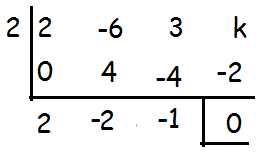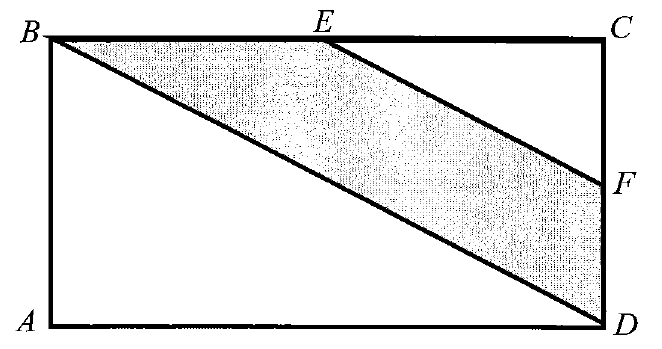SOLVING CUBIC EQUATIONS WHEN ADDITIONAL INFORMATION OF ROOTS ARE GIVEN
Question 1 :
Solve the equation 3x3 − 26x2 + 52x − 24 = 0 if its roots form a geometric progression.
Solution :
Let the roots of the cubic equation be a/r, a and ar.
By comparing the given equation with general form of cubic equation, we get
a = 3, b = -26, c = 52 and d = -24.
In any cubic equation ,
Sum of roots = -b/a = 26/3
Product of roots = -d/a = 24/3 = 8
(a/r) + a + ar = 26/3
a[(1 + r + r2)/r] = 26/3 ---(1)
(a/r) a (ar) = 8
a3 = 8, a = 2
By applying the value of a in (1), we get
2[(1 + r + r2)/r] = 26/3
[(1 + r + r2)/r] = 13/3
3r2 + 3r + 3 = 13r
3r2 - 10r + 3 = 0
r = 1/3, r = 3
When a = 2 and r = 3
a/r = 2/3, a = 2 and ar = 2(3) = 6
Hence the roots are 2/3, 2 and 6.
Question 2 :
Determine k and solve the equation 2x3 − 6x2 + 3x + k = 0 if one of its roots is twice the sum of the other two roots.
Solution :
Let a, b and c be the roots of the cubic equation.
a = 2(b + c)
Sum of roots = -Coefficient of x2/coefficient of x3
= 6/2 = 3
a + b + c = 3
2b + 2c + b + c = 3
3(b + c) = 3
b + c = 1
c = 1 - b
By applying the value of c in a = 2(b + c), we get
a = 2(b + 1 - b)
a = 2

k - 2 = 0
Hence the value of k is 2.
2x2 - 2x - 1
x = (-b ± √b2 - 4ac)/2a
x = (2 ± √4 + 8)/4
x = (2 ± 2√3)/4
x = (1 ± √3)/2
The required roots are 2, (1 ± √3)/2.
Kindly mail your feedback to v4formath@gmail.com
We always appreciate your feedback.
©All rights reserved. onlinemath4all.com
Recent Articles
-
Digital SAT Math Problems and Solutions (Part - 137)
Apr 06, 25 08:42 AM
Digital SAT Math Problems and Solutions (Part - 137) -
Digital SAT Math Problems and Solutions (Part - 136)
Apr 06, 25 08:38 AM
Digital SAT Math Problems and Solutions (Part - 136) -
Logarithm Problems and Solutions (Part - 2)
Apr 05, 25 12:09 PM
Logarithm Problems and Solutions (Part - 2)
